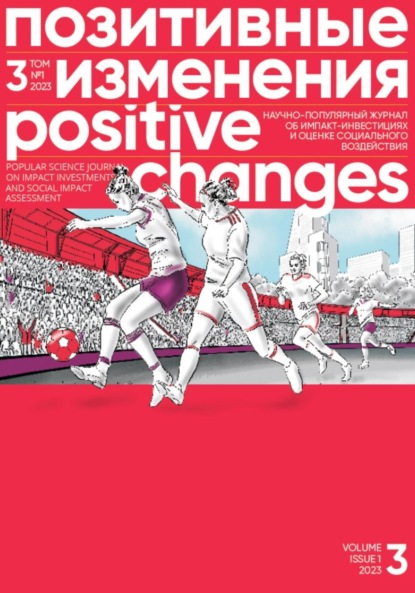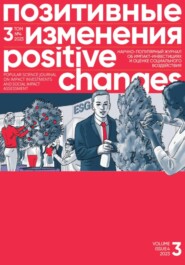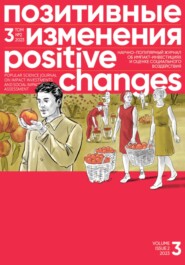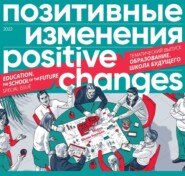По всем вопросам обращайтесь на: info@litportal.ru
(©) 2003-2024.
✖
Позитивные изменения, Том 3 №1, 2023. Positive changes. Volume 3, Issue 1 (2023)
Настройки чтения
Размер шрифта
Высота строк
Поля
“Any profession is constantly evolving in some direction. Professions are becoming more and more niche, evaluation is no exception. It’s a small profession, but it’s growing pretty fast,” she says.
WHERE DO EVALUATION SPECIALISTS COME FROM?
There are not as many people around the world with a degree in evaluation as there are lawyers or economists. Our colleagues in the West have Master’s and PhD degree programs in evaluation, but given its interdisciplinary nature, the number of people in this profession is not determined by the number of those who received a University degree, experts say.
So where do specialists in evaluation come from, and how do they build a professional career? Alexey Kuzmin says that the Association of American, Canadian, and European specialists in evaluation, which has several thousand members each, consists of people with very different backgrounds.
“Let me list: just in terms of the underlying education, there are psychologists, sociologists, educators, medics, engineers, computer technology specialists, economists, managers, statisticians. Of course, if you graduated from a University program where you received training in sociological research methods, it’s a good help,” he says.
The expert himself came to the evaluation in the late 1990s from organizational development consulting. In 1999 he became a member of the American Evaluation Association, attended conferences and seminars abroad, read literature in English, and in 2001 he decided to attend a PhD program in the United States, specializing in organizational behavior and program evaluation.
“A lot of people overseas that I know of have professional careers as internal evaluation specialists. This is, of course, common in large companies. The common denominator for all stories is that at some point a person faces the need for evaluation, and something resonates inside, they find it exciting. And that’s where you start a turn in this direction – searching for information, training, searching for specialists who do this,” says Alexey Kuzmin.
Elena Malitskaya also cites 1998–1999 as the years in which her work became closely tied to evaluation. “At that time, we at the Siberian Civic Initiatives Support Center were conducting our own grant competitions. So we had a need for monitoring, evaluation and training. We just started integrating evaluation into our work routine and into the work of our network of resource centers. In 2000, we held the first school of evaluation and international conference in Novosibirsk, which eventually grew into regular activities,” Elena Malitskaya says.
Alena Bogomolova, head of the Resource and Methodological Center of the Road Home Charitable Foundation and a board member of the Association of Specialists in Program and Policy Evaluation, is one of those who received training from SCISC and The Garant Center at the International School of Evaluation. Alena Bogomolova is a sociologist by education. She says she had done many practical projects during her University years that were related to evaluation in one way or another, except that it was called differently at the time. “It was called sociological support in the early 2000s, at least in Cherepovets. But the set of activities was the same as what we now call evaluation, or evaluation design. I have studied before, I am studying now, and I will continue to study, because evaluation is a constantly evolving profession,” she says.
Irina Efremova-Garth and Natalia Kosheleva received their Master’s degrees from American universities. Irina earned her MPA (Master of Public Administration) from the School of Public Administration at the University of Delaware.
“In my two years of training, my schedule included classes on various research methods, on evaluation in general, on evaluation in nonprofit organizations. It was so delicious, so interesting, and so exciting that all my plans to go into the government went straight to the bottom of my priority list. I returned to Moscow realizing that I would be involved in evaluation and nonprofit organizations,” the expert continues.
She says she has been in different roles: the customer of evaluation, internal evaluator, and external evaluator. Her work at IBM had given her some interesting insights: data-savvy and digitally savvy nonprofits are much more likely to achieve their mission, to be able to prove their contribution to addressing the social problem at hand.
Natalia Kosheleva learned about evaluation during her Master’s degree studies at Indiana University’s School of Public and Environmental Affairs.
“It was March 1996. I came across a vacancy announcement for a specialist to evaluate two environmental projects funded by IREX (International Research and Exchanges Board). That was the first time I saw evaluation might be a thing. The beauty of an American university is that it has an open library. I just went in, found some books on the topic, read them, got an idea about the general principle, and applied. And they hired me,” Natalia Kosheleva explains.
Irina Sinelina, a specialist in program and project evaluation at International Labor Organization (ILO), received her Master’s degree in Nonprofit Management in the United States and interned at a nonprofit organization in New York. Then she returned to Moscow and got her first job at a nonprofit organization, where she was to analyze the effectiveness of trainings, before coming to work at the International Labor Organization, as an evaluation officer.
“Like all UN organizations, ILO has an internal evaluation system. This is done for the purpose of donor accountability, increased experience, and work improvement. Like the rest of the UN system, we follow the standard criteria developed by the Organization for Economic Co-operation and Development (OECD). There are five basic principles: relevance, effectiveness, efficiency, sustainability, and impact. Two years ago, another one was added – coherence,” Irina Sinelina says.
Marina Mikhailova learned the principles and approaches to evaluation (including organizational development evaluation and personnel evaluation) from Process Consulting and the Siberian Civic Initiatives Support Center, and international schools.
“All the small pieces got together, one after another, to build the big theoretical experience. In practice, it is, first of all, extensive experience in evaluating projects submitted for grant competitions. We, at the Garant Center, have been organizing these contests since 2001 in Arkhangelsk Region. Later I took part in reviewing applications for other contests and evaluating the results of the projects we had supported. I also had some experience in evaluation from the times I was the director of a recruitment agency. as such, I had to evaluate personnel and the management system in the organization,” Marina Mikhailova continues.
KNOWLEDGE AND COMPETENCIES
The topic of knowledge and competencies in evaluation is closely related to the topic of learning. If we know what the competencies are needed, we know what to teach them, and how to write job descriptions.
Since the late 1980s, various professional associations of evaluators started publishing lists of competencies. For example, the UN Evaluation Group believes that an evaluator should have basic professional competencies, technical skills, management skills, interpersonal skills, and promote a culture of evaluation.
Canada, a country that has established a certification system for evaluators, suggests the following areas of competence for a practicing evaluation specialist[18 - Canadian Evaluation Society. (2023). Evaluator Competencies. Retrieved from: https://evaluationcanada.ca/career/evaluator-competencies.html. (accessed 01.03.2023).]:
1. Reflexive – competencies related to fundamental norms and values in the field of evaluation, as well as awareness of one’s own expertise and needs for professional growth.
2. Technical – competencies related to specific aspects of evaluation: planning, data collection, data analysis, reporting.
3. Situational – competencies related to evaluative thinking applied to analyze and consider the interests, problems, and circumstances specific to each evaluation.
4. Managerial – competencies related to the project/evaluation management process (budgeting, resourcing, management).
5. Interpersonal – competencies related to communication, negotiation, conflict resolution, cooperation.
The Association of Specialists in Program and Policy Evaluation has not yet produced a similar list of competencies. Natalia Kosheleva, ASPPE President, emphasizes an understanding of how programs and projects work as one of the core competencies of evaluation specialists in Russia. Equally important is the ability to collect, analyze and present data. Communication and interpersonal competencies are necessary for those involved in external evaluations. Finally, visual communication skills are increasingly demanded lately.
Alena Bogomolova says that an evaluator needs to be able to exchange opinions and knowledge freely.
“You need groups of people or platforms where you can talk about what you’re getting/not getting and discuss everything before embarking on the journey of evaluation: the best ways to proceed, questions to formulate, design to use. You need to be able to talk to other people about it. Because it is very difficult to develop in a vacuum. What else is important? In my opinion, it is vital to have your own value-based professional position, from which you will make an evaluation,” she says.
Marina Mikhailova agrees: “To be a professional, you have to be part of the professional community, sharing experiences, learning from others, communicating. And it is important that would-be evaluators follow ethical standards. Still, evaluation is not an audit, not an inspection. And here it is important to remember that evaluation is not about giving an A or an F; it is about answering the right questions and making the right decisions. An evaluator is a person who has come to help sort things out,” Marina Mikhailova explains.
Evaluation is an incredibly interesting field, Irina Efremova-Garth notes, because an evaluator must have skills from many different areas.
“You have to be extremely proficient at doing different kinds of research, extremely good at data crunching. You must have very good management skills. After all, evaluation is rarely done by just one person. It usually requires a team, so you have to be able to build processes properly, allocate roles in the team and manage results. You have to have reflection, critical thinking skills,” the expert adds.
Irina Sinelina believes that it is important to have a good basic education in liberal arts, which builds analytical skills, and a good knowledge of English, because much of the material about evaluation is written in English. The rest you can learn by practice.
PROFESSIONAL STANDARD
As mentioned earlier, one of the stages in the development of a profession is a professional standard. Why do we need a professional standard in any activity? As noted in Decree No.23 of the Russian Government dated January 22, 2013 professional standards are applied[19 - Garant.ru. (2013) Decree No.23 of the Government of the Russian Federation dated January 22, 2013 “On the Rules for the Development, Approval and Application of Professional Standards”. Retrieved from: https://www.garant.ru/products/ipo/prime/ doc/70204190/. (accessed: 01.03.2023).]: in developing the personnel policy, preparing job descriptions, in developing vocational education programs and standards.
According to Alexey Kuzmin, an attempt was made in 2015 to develop a professional standard for a specialist in program and policy evaluation in the social sphere. It was initiated by an independent business expert, Alexander Ovchinnikov. The application for development was registered at the Ministry of Labor of Russia website. A working group was established, including representatives of Process Consulting Company and ASPPE, basic research and analysis of the professional activities were conducted, the first draft of the professional standard was developed, and a public discussion took place; however, the work on the document was halted at some point, and the professional standard was not approved by the Ministry.
“I think it is a little premature to develop such a professional standard today. There is no profession yet, it has not yet been established. The big picture, as seen by the Ministry of Labor, still lacks both supply and demand for this profession,” Alexey Kuzmin explains.
Natalia Kosheleva suggests that the ministry’s job was to develop professional standards for basic professions, something that a program and policy evaluation specialist clearly isn’t so far.
“The Ministry of Labor had different expectations at the time, and it had a mission to cover all mass occupations. Ours is definitely not one of those. I think that was the reason. But the standard may indeed emerge at some point, as the profession develops further. When we gain enough visibility for the state to decide we need regulation. It’s like the story of licensing all kinds of activities. To be seen, there must be a lot of you,” says Natalia Kosheleva.
The National Council for Professional Qualifications under the President of the Russian Federation also reviews drafts of professional standards in Russia. Based on the National Council’s conclusions, a decision is made to approve professional standards. As explained by Artem Shadrin, General Director of the National Agency for the Development of Qualifications, when developing a professional standard, it is important not to duplicate existing ones, approved under a similar name. It would be good to get the support of some reputable organizations working in this area, as well as the relevant federal ministry, which would confirm the need for developing such a document.
Once a professional standard has been approved by the Ministry of Labor of Russia, it is then sent to the National Council for Professional Qualifications under the President of the Russian Federation. If approved by the National Council, which represents leading employers’ organizations, such as the Russian Union of Industrialists and Entrepreneurs, the Chamber of Commerce and Industry, trade unions and federal ministries, the standard is then enacted by order of the Ministry of Labor and registered with the Ministry of Justice.
Why does the professional standard story remain unfinished? What could be the reasons?
“First, the Ministry of Labor may see no need for such a professional standard. This is a classic unsolved problem. For example, as for a director per se, there is no such professional standard, and the ministry believes that it is not necessary. Likewise, there is no professional standard for an entrepreneur. On the one hand, this doesn’t seem like a job function; but, on the other hand, it can be considered a type of professional activity. The Ministry of Labor has not yet agreed to develop a professional standard for this activity,” Artem Shadrin says.
He explains it may also happen that an initiative group tasked with developing a professional standard fails to have it approved by the relevant ministry, or the project might not win support from professional associations.
“You cannot get a standard approved without a consensus in the professional community. That’s the challenge: developing a professional standard is a search for touching points. Its development is a long story, but nevertheless, nothing is impossible. As long as there is a desire and support from the relevant ministry, which is always important,” Artem Shadrin adds.
WHAT DOES THE EVALUATION SPECIALIST AS A PROFESSION STRIVE TO GIVE TO THE SOCIETY?
The American philosopher Thomas Schwandt wrote an article in 2017, in which he outlined the need to discuss the ethos of evaluation[20 - Schwandt, T. A. (2017). Professionalization, Ethics, and Fidelity to an Evaluation Ethos. American Journal of Evaluation, 38(4), 546 553. https://doi.org/10.1177/1098214017728578.]. That is, the lifestyle of a social group that associates itself with evaluation. According to him, right now, most of the professional community is just talking about competencies and training. Specifically, he writes:
“…Most glaring is the lack of active discussion about what professionalism in evaluation means and what the profession itself seeks to bring to the society.”… “The critical question for the global evaluation community is how that community understands its role in relation to its clients and the society at large.”
What do members of the Russian program and policy evaluation community think about this, and how would they answer the question posed by Thomas Schwandt?














